My name is Irina @irene_illusion. Originally from Moscow, I have a degree in Public Relations and Advertising. I worked in communication agencies and later as an educational consultant, helping students get into top universities and boarding schools in the USA, UK and Europe.
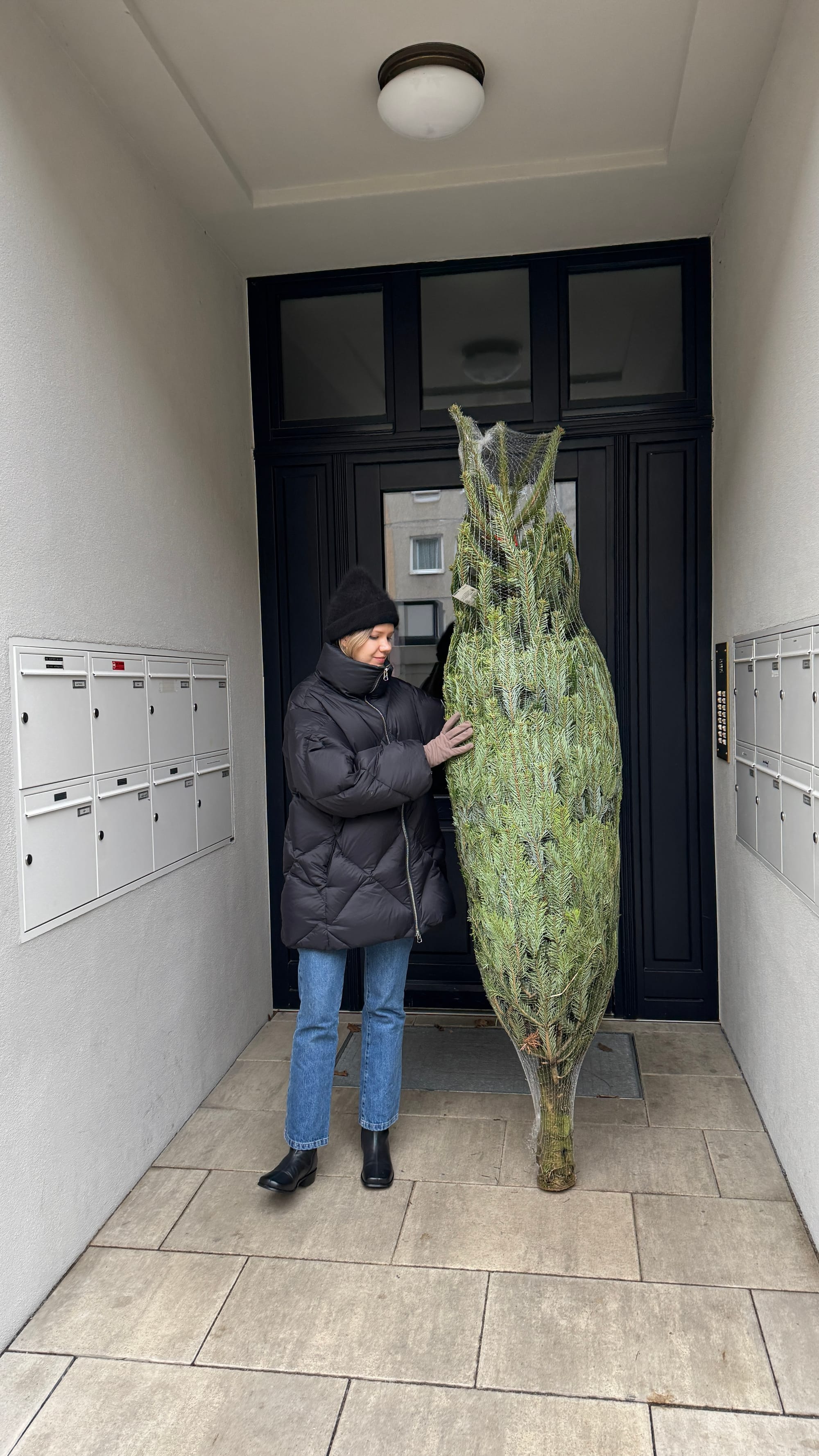
I moved to Germany with my husband Dmitry after he received a job offer from a German company. Moscow with its competitiveness was never quite a match for me, and I always wanted to try living in a European country. We've been living in Berlin with our Boston terrier Ivy for a little over two years – and today I’m sharing our relocation story.
Berlin: First Impressions
Berlin felt like a contrast to my home city. It’s a global capital where you can find everything you need: food from all over the world, a vibrant arts scene, diverse communities, yet it’s hardly a typical megapolis. People aim to finish work by 4 pm, planes don’t fly at night to respect residents’ peace, and large areas where flats would sell like hotcakes remain empty because they are home to rare reed frogs and no one can agree on where to relocate them. As Berlin seems to say: "Let us stay cozy, we don’t need grand projects or major changes."
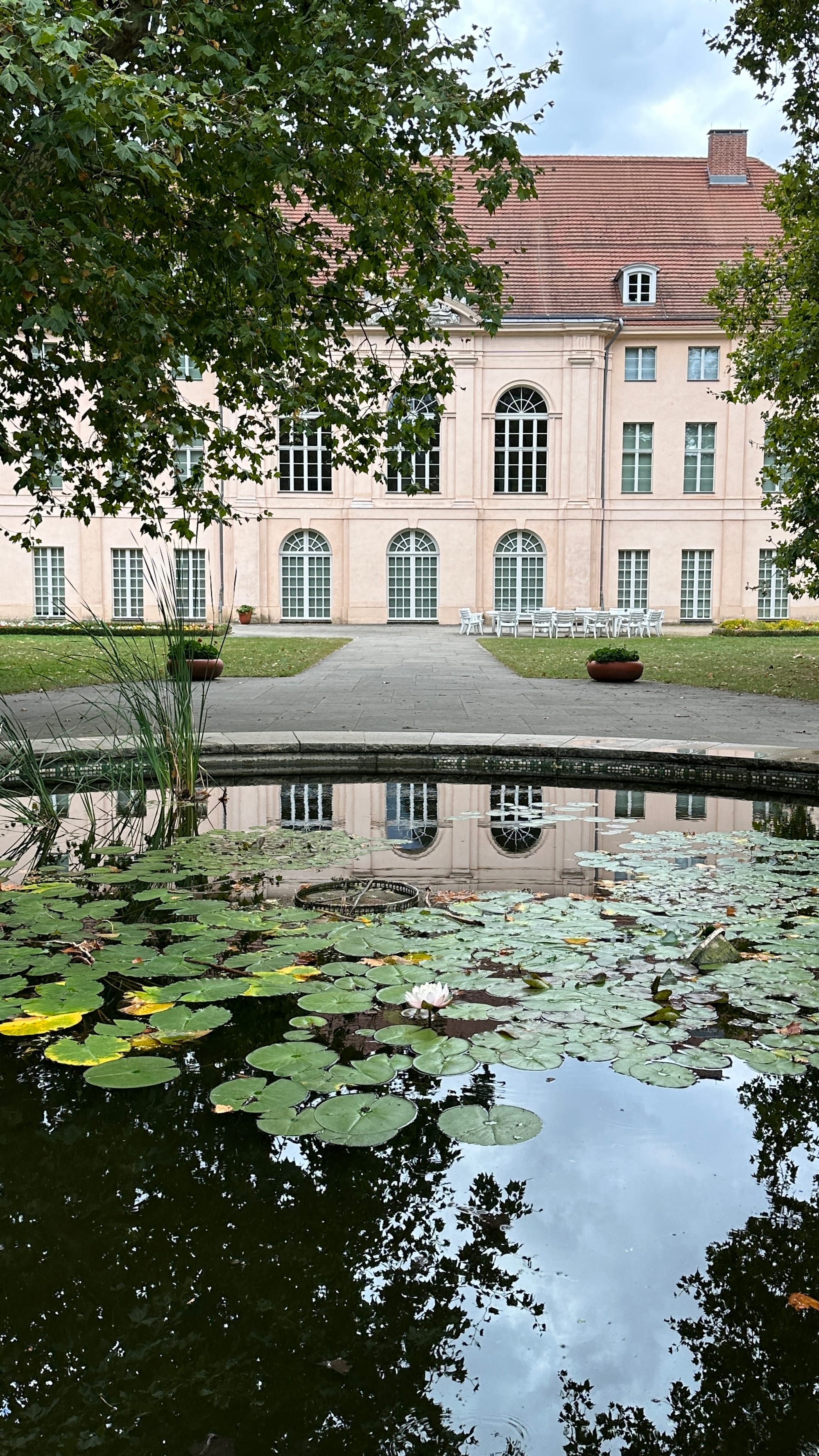
The diversity of neighborhoods in Berlin is striking. We spent a lot of time exploring, first just to get a feel for the city, then for apartment hunting. What impressed us most was how different each area felt, making Berlin a collection of unique, smaller communities within one large city.
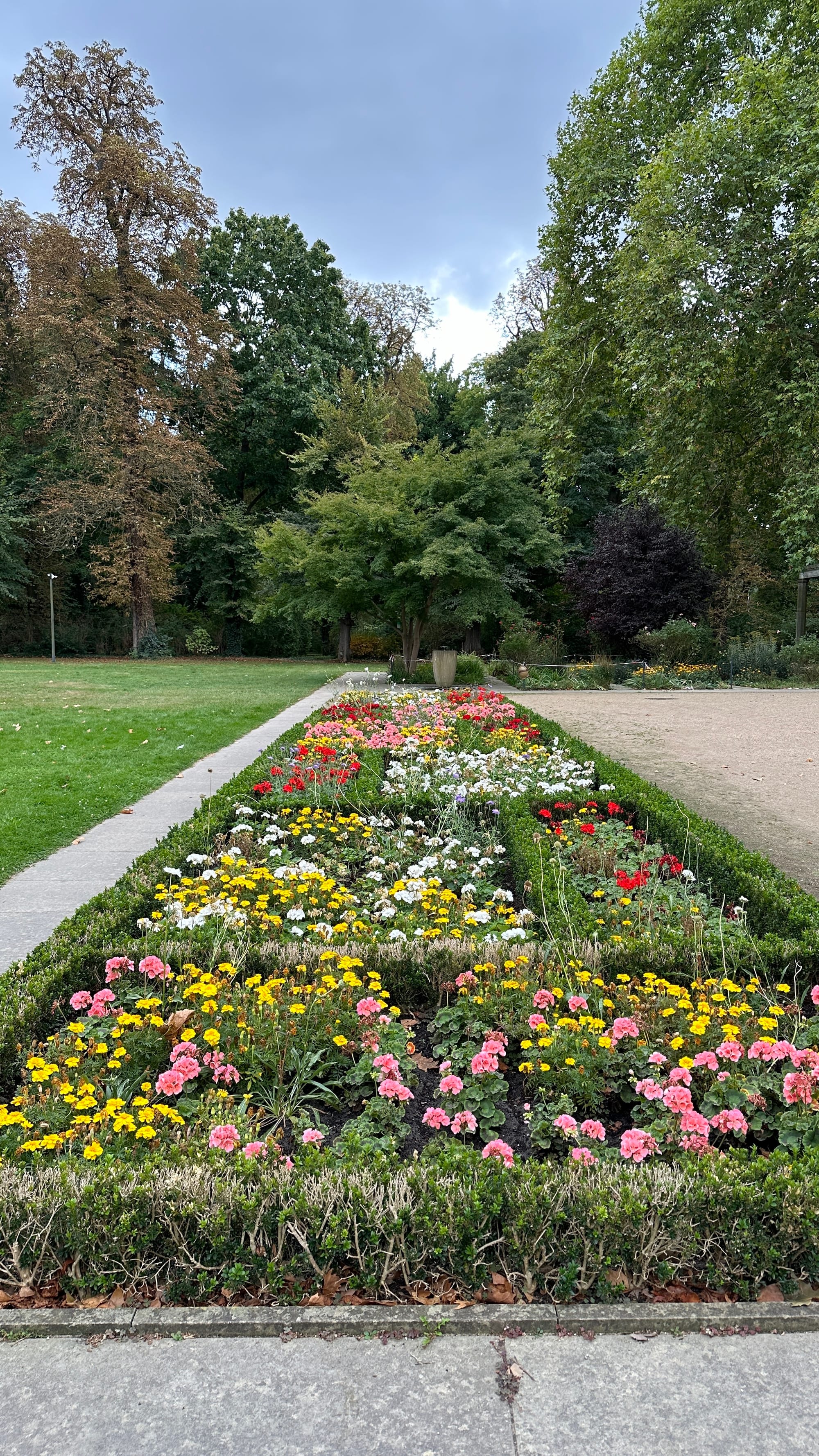
Of course, there's that spirit of freedom and being accepted for who you are. People love to complain: ‘It used to be more authentic, not like now.’ But you know, that’s something people have always said. It still has distinctive local vibes. Everyone, regardless of age, joins demonstrations, and on May 1st, the entire city turns into a huge outdoor party.
My husband and I are big fans of punk rock concerts. In Russia, it’s a very niche scene, mostly for younger crowds, but here in Berlin, we’re among the youngest, even in our 30s. When the German band Die Ärzte played in the former Tempelhof Airport last summer, it was a three-day event that felt like a national celebration.
What I like about Berlin?
Despite the fact that Berlin often gets criticized, I find it very comfortable to live here. I like the people; the majority are very attentive to others, yet at the same time, not intrusive. For me, the biggest advantage of living in Berlin is the close proximity to nature. While everyone talks about Berlin's reputation as a party capital, not many highlight how much green space there is within the city limits. There are plenty of beaches, parks everywhere, you have the vast Grunewald Forest. The sunsets are amazing, and it’s not uncommon to see foxes and raccoons wandering down the streets.
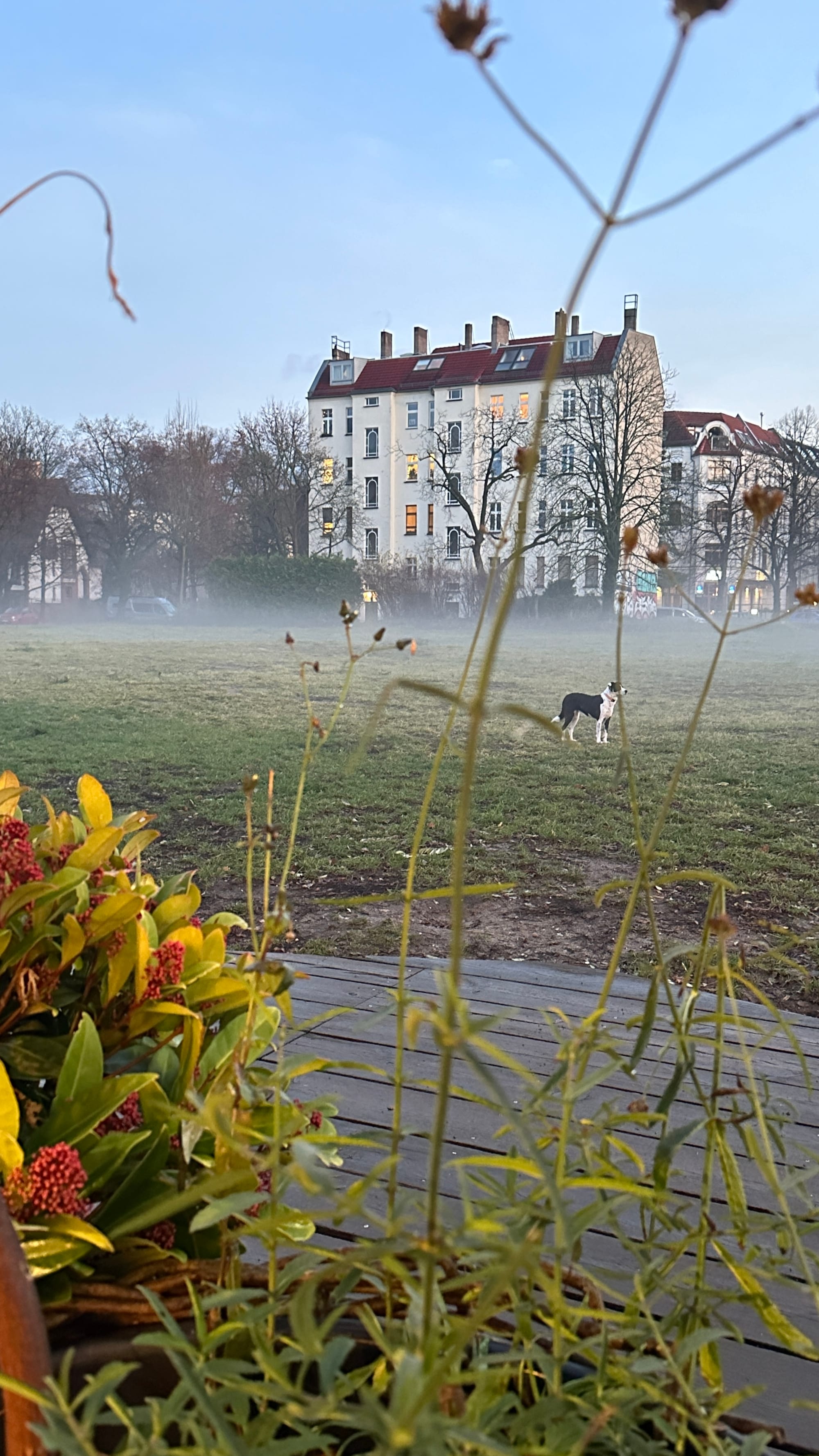
I instantly and inevitably became a birdwatcher, which is a very popular local hobby. Did you know that Berlin is the capital of Goshawks? Its density is higher here than anywhere else in the world, urban and rural. I've already spotted around 100 different bird species, by the way!
Choosing Our Neighborhood
Here are my top 5 factors when deciding about the neighborhood:
· Access to green spaces for walks with our Boston Terrier, who’s quite the explorer
· A place that’s not overcrowded, with a safe and quiet atmosphere
· Clean, nice-looking streets that feel pleasant to go for a walk
· Efficient public transportation and easy access to the city center, plus availability of street parking or a parking space
· A variety of grocery stores in the area
Our first temporary apartment was in Lankwitz, with its suburban, almost countryside charm. We really liked living outside the hustle and bustle yet with the convenience of reaching the city quickly. After that, we considered neighborhoods outside the Ringbahn in West Berlin, such as Steglitz-Zehlendorf, Wilmersdorf, and Dahlem. But as they say in Berlin, it’s not you who chooses the apartment or the neighborhood – it chooses you. So, we moved to a completely different part of the city!
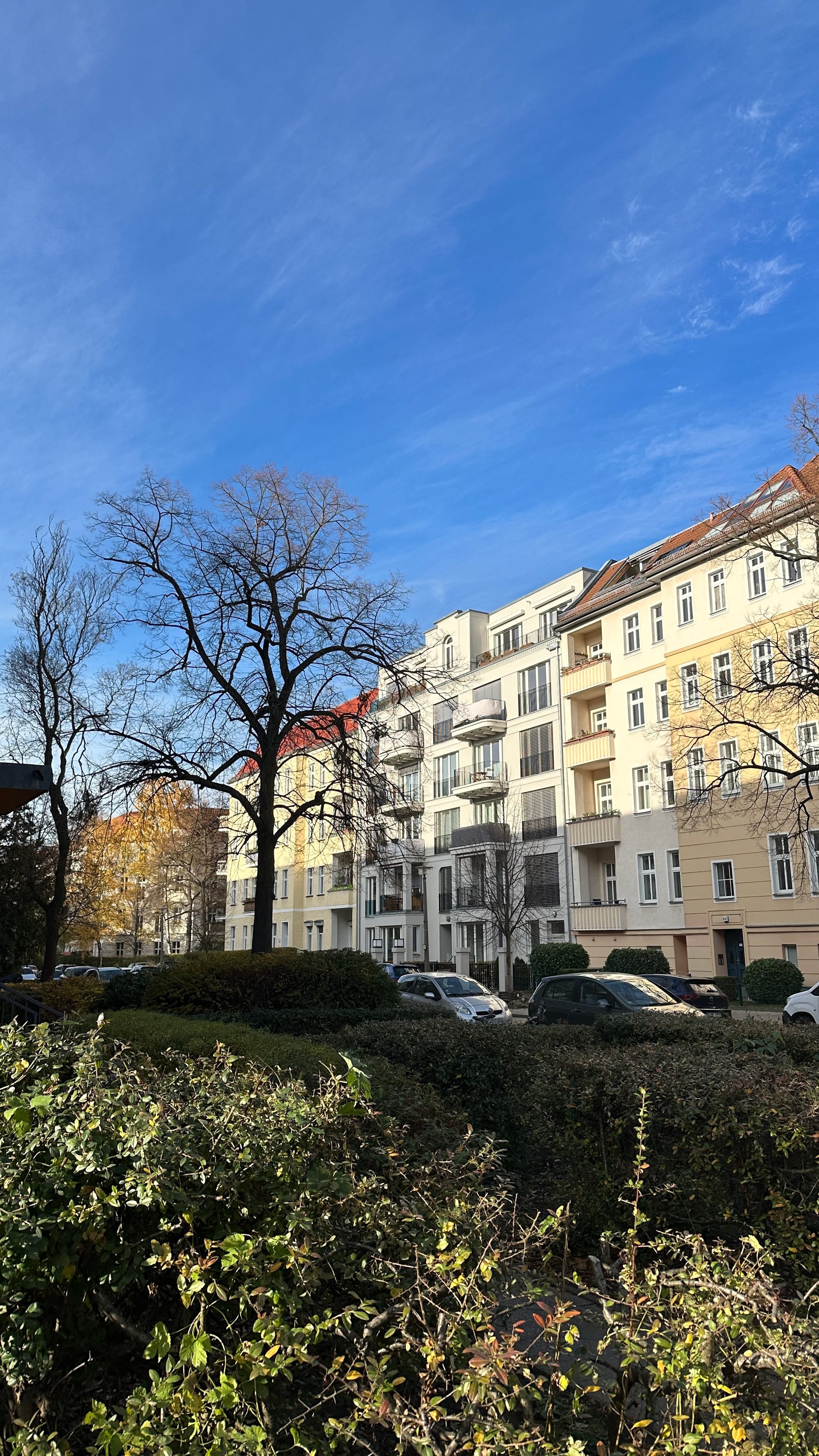
We ended up in Pankow, which met all of our criteria except for the fact that it’s not located in the Western part of Berlin. It’s a tranquil area with lots of greenery, popular among German families. From here, it’s just as easy to reach the eastern center as it is to get out into the countryside or forest. It's also close to the livelier Prenzlauer Berg, and it only takes about 10 minutes by bike to get to the Saturday market or a yoga class.
While other districts often struggle with garbage on the streets, here we rarely see any litter. Residents plant flowers and hang bird feeders. Pankow is full of beautiful houses, but there’s also some GDR-era heritage, with grey panel buildings.
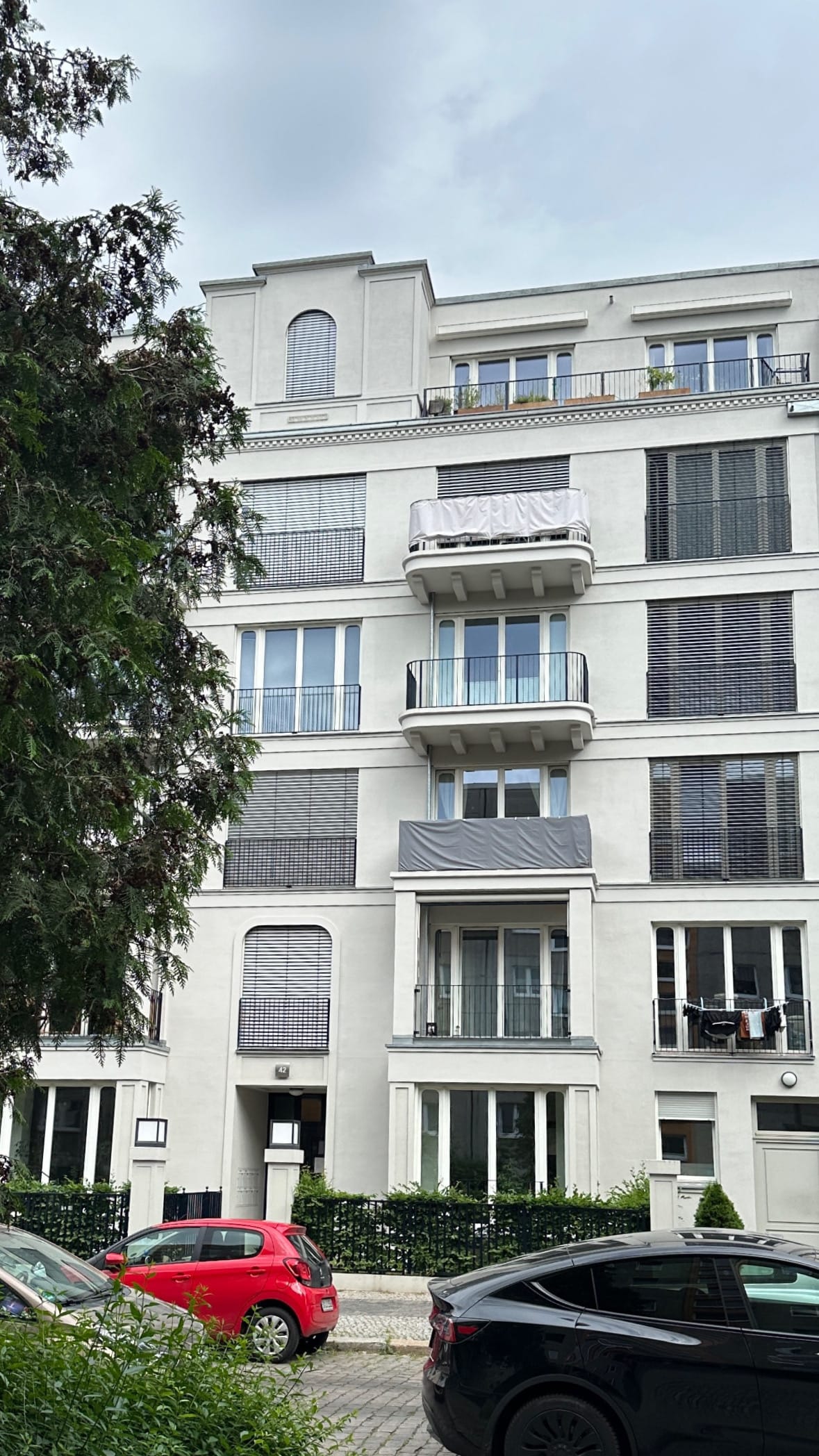
Our area is well connected, which is very convenient, especially if one form of transport is disrupted due to repairs or strikes. There’s a bus and tram stop near our house, and both the S-Bahn and U-Bahn are a 15-minute walk away. It's not as close as we would have liked, but the walk is actually quite nice and healthy. It’s also very convenient to drive here, as you can quickly get to the autobahn and out of the city for a day trip.
I’d like to highlight some of my go-to places in our neighborhood. First, two amazing parks: Bürgerpark Pankow and Schlosspark Schönhausen. Two Fellas Bar and Restaurant is another favorite; they host food pop-ups and drawing workshops every week. Florakiez is a charming area with old buildings, cafés, and little shops. It reminds me of Prenzlauer Berg, but it’s less trendy and more laid-back. For coffee, I love Kiez Kaffee Kraft and Eden Café.
Although it's a bit farther than the other places on my list, I’d like to mention Kutzner & Kutzner which is my beloved organic grocery shop. The owner has fantastic taste in music, so it’s a pleasure to buy your veggies while listening to Iggy Pop or David Bowie.
One of my preferred events is the BSR Kieztag. It's a neighborhood exchange market where people come together to give away items they no longer need. I absolutely love it! It’s a fun way to meet neighbors, chat, and find hidden gems while also being mindful of the environment. We found chairs for our balcony and a new shelf for our cellar.
House Hunting in Berlin
Many people have heard about the long queues at viewings – it's a common sight in the city. Imagine arriving at a viewing, and there’s a line of people stretching out the door, all hoping to secure the same apartment. The process can be frustrating, as the demand often exceeds the supply.
Additionally, rental prices in Berlin have been rising steadily, making it more difficult to find affordable apartments. Many landlords prefer tenants with established local backgrounds; for example, Germans who work as doctors or lawyers are perfect candidates, and this can be an issue for newcomers. It's important to be patient and proactive, as well as flexible with your requirements, because finding an apartment often takes time.
Keep in mind that there are many specific rules and regulations when renting in Berlin. Most rental contracts in Berlin are unlimited, meaning that you can stay as long as you follow the rules. Most apartments are rented out empty, often without kitchens. Besides, landlords usually require proof that your monthly income is at least three times the cold rent – in other words, your rent without utilities. Typically, landlords require up to three months' cold rent as a security deposit. There are also limits on how much landlords can increase rent.
Renting in Berlin: Step-by-step Guide
For digital search, we used ImmobilienScout24 with a premium account, which helped to increase visibility and access to new listings faster. Personally, I didn’t consult with any companies or agents, and we didn’t have any additional costs related to signing a rental contract.
The whole process took us around five months, but that’s because we wanted to find a place that matched our criteria as closely as possible. Along the way, we were offered several contracts, but at the time, we felt they weren’t 'the one' – and were still motivated to keep searching. In fact, we even were offered the very first apartment we viewed. It was great – renovated and spacious – but felt a bit too far from everything. It’s funny to think that if we had taken it, we could have told everyone how quick and easy it is to find an apartment in Berlin.
To successfully rent an apartment, you don’t necessarily have to speak German. My husband and I communicated in English during viewings, and for written communication, translators and AI worked just fine. Speaking German can help in some cases since personal impression still matters, but for big rental companies, documents are more important – they give the contract to the first suitable candidate. And for some apartments and landlords, even fluent German isn’t enough if you don’t have a German surname.
To secure the deal, it is pretty much monitoring ImmobilienScout24 all day, every day, and replying to new listings immediately. If you're lucky, you get invited to a viewing among other candidates. Then, if you are interested, you send all the required documents immediately. We sent hundreds of inquiries, went to around 25 viewings, and got 5 contract offers.
Choosing Our Apartment
We have been living in our place for 1.5 years by now. It’s a 2-room apartment in a new building that blends beautifully with the surrounding Altbau. There are two front gardens attached to the building facing the street, which reminds me of the entrance situations in London and New York apartment buildings. Since we live on the ground floor, we have the bonus of a small private garden where our dog can sunbathe or run around.
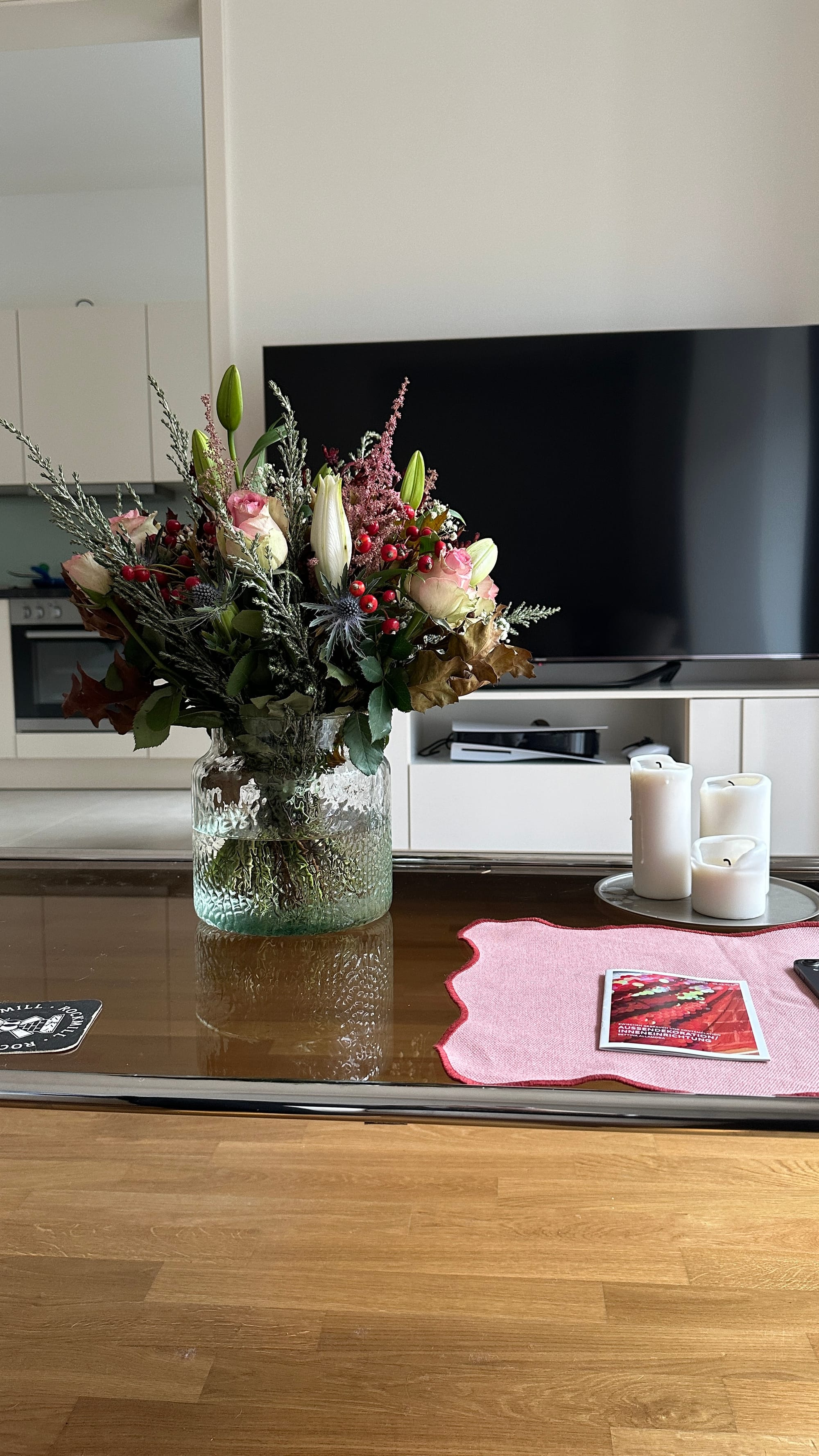
The apartment is spacious, around 75 sq. m., with a balcony, a guest toilet, a utility room for the washing machine and dryer, and a tiny extra room which I use as my closet and make-up station and jokingly call my boudoir. The kitchen is quite roomy, which was important for me as I love cooking. The wooden floor-to-ceiling windows face two sides, which gives us different views and better ventilation. There’s also enough space for a home office since my husband works from home most of the time.
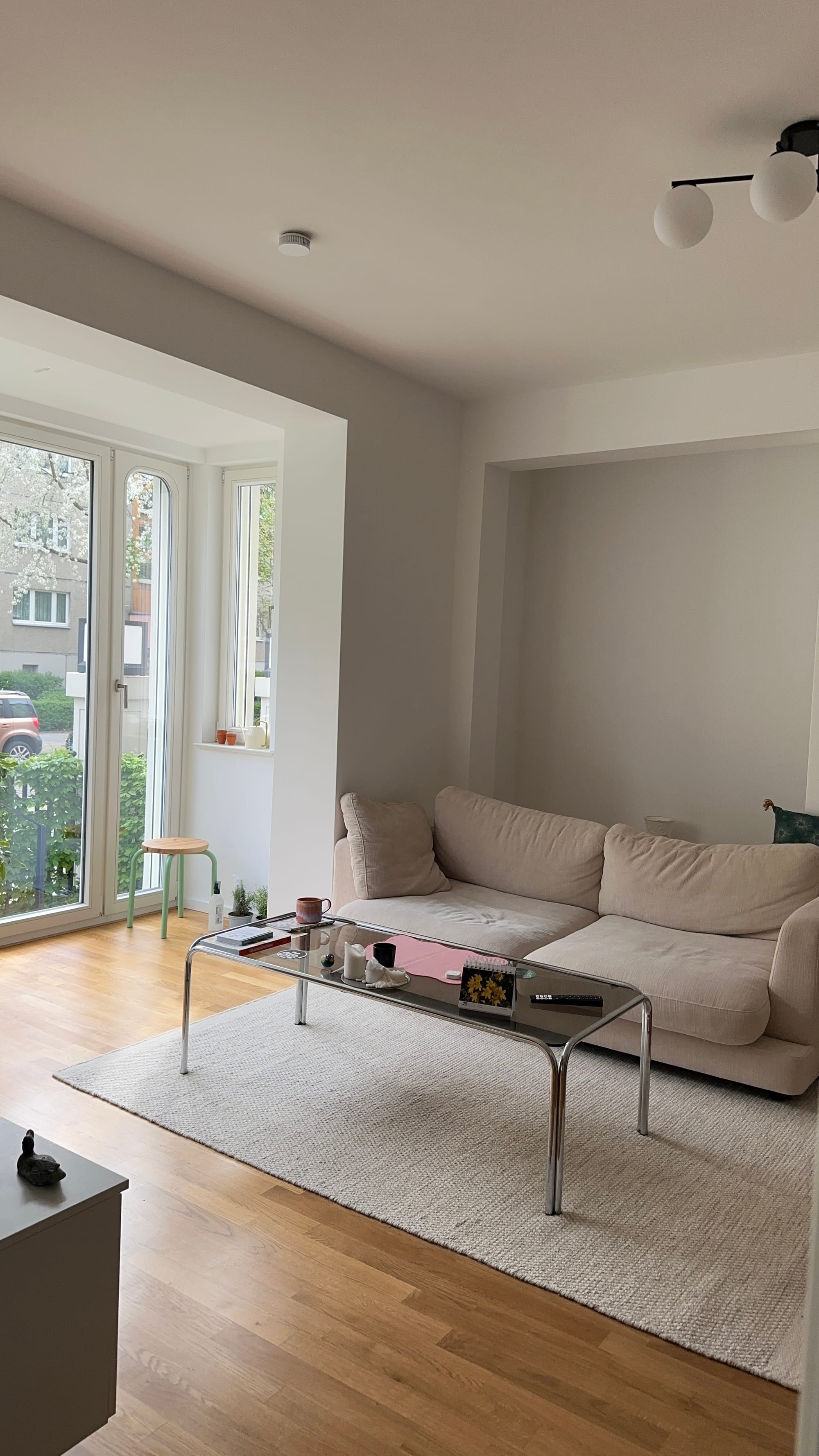
Our rent includes Nebenkosten, which is common in Berlin. These additional costs cover things like water, heating, waste disposal, and building maintenance. At the end of the year, we receive a bill, which shows whether we either get a refund or have to pay extra based on actual usage. It’s a bit unpredictable, but that’s just how it works here. In addition to that, after moving in, we had to set up our own electricity provider and choose an internet plan.
Renting an accommodation in Berlin can definitely be overpriced nowadays, especially for new buildings. However, it's still possible to find reasonable prices if you are patient. While negotiating the initial rent is not possible (remember the long queues of candidates), you can sometimes negotiate later with the assistance of the special company.
Our Housing Journey: Summary
We joke that we have lived a dozen different lives in Berlin, in various districts, during the viewing process. Often, after visiting an apartment you really like, it seems perfect: you imagine walking your dog there, arranging the furniture, and which cafés you’ll pop into for coffee. But then, they choose someone else, and the whole process starts over again.
We did a lot of research before moving, talked to friends with experience and knew what to expect. I wouldn’t say anything really came as a surprise, yet the most difficult part was the uncertainty and competition. You can spend weeks or months searching, sending hundreds of inquiries, and going to dozens of viewings – only to get rejected or never hear back.
Often, you can't even ask questions about the apartment, as it might be seen as uncertainty instead of interest. There’s a long queue behind you, and the apartment will likely go to someone who is more confident.
Useful Tips
Here are some tips I’d like to share, especially if you plan to rent in Berlin for the first time. To start with, include your CV as the first page of your document folder even if it is not listed among the required documents. Describe yourself as a potential tenant and person.
If you're searching for a place with a pet, it will be more challenging, but it's not impossible. Attach a nice photo of yourself and, if you have pets, provide a little story that demonstrates what angels or couch potatoes they are and how responsible you are as a pet owner. It can really help, as the personal touch sometimes makes all the difference, especially when everything else is in order. Our landlord definitely reviewed our CV, as in our rental contract it was specifically mentioned “Boston Terrier, Ivy” – not just “a dog”.
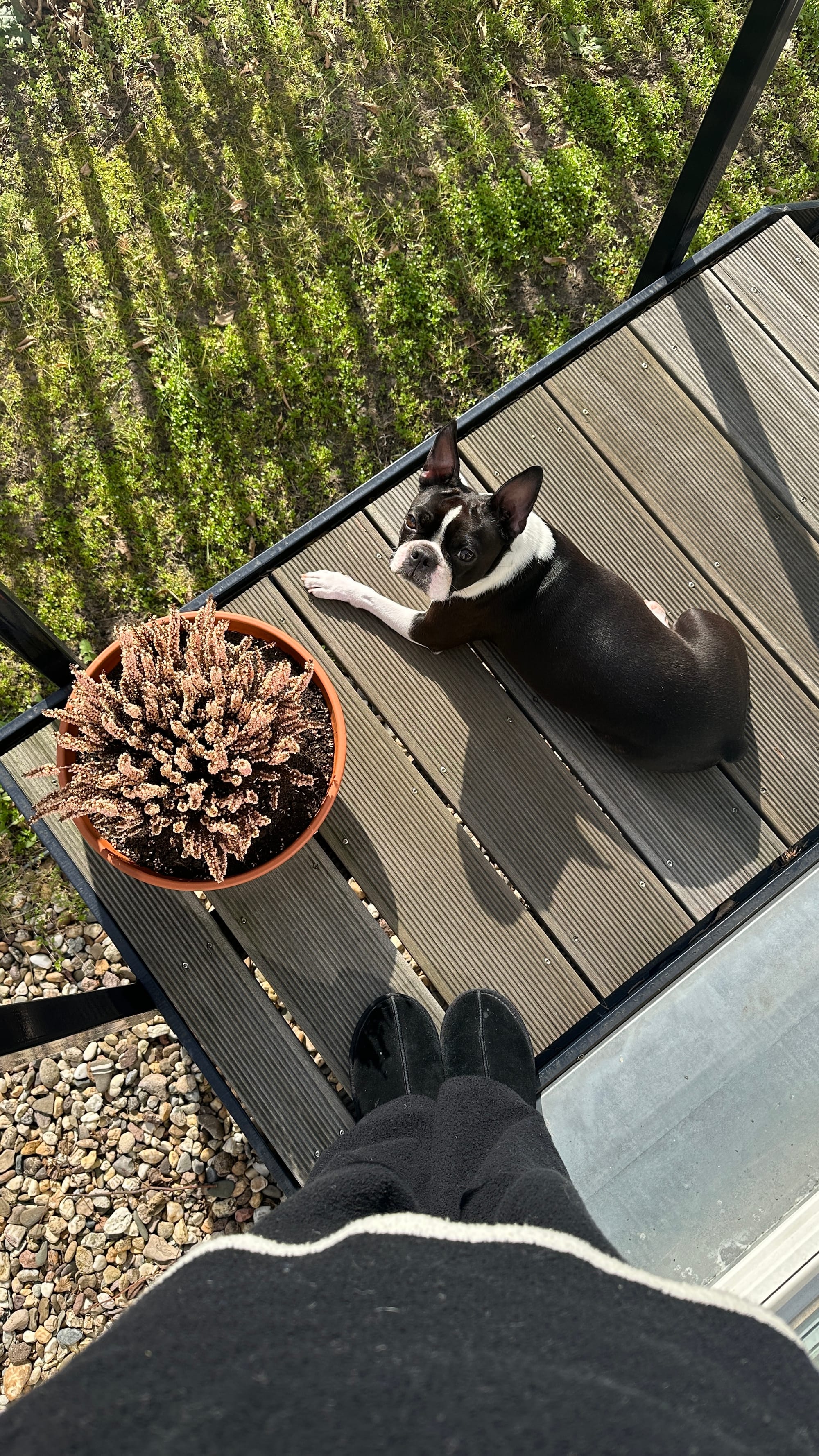
A common mistake people make when renting in Berlin is not being flexible enough. Either rushing into the first available option out of fear of not finding anything better or insisting on finding the perfect apartment in a specific district, you might end up searching forever. So, it’s important to strike a balance, staying open to compromises on location or amenities while keeping your main priorities in mind.




